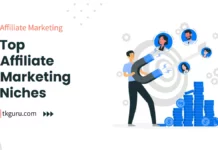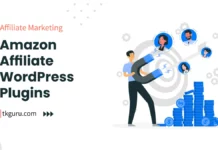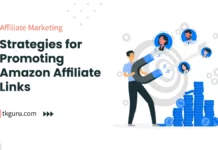Advertisements
Ratings
“Can I use adsense & amazon ads on same page of website?
Can I Use adsense & bluehost Ads on same page of website?
You all must have this kind of questions in your mind.
Below article will solve this puzzle of yours. Just take a look.”
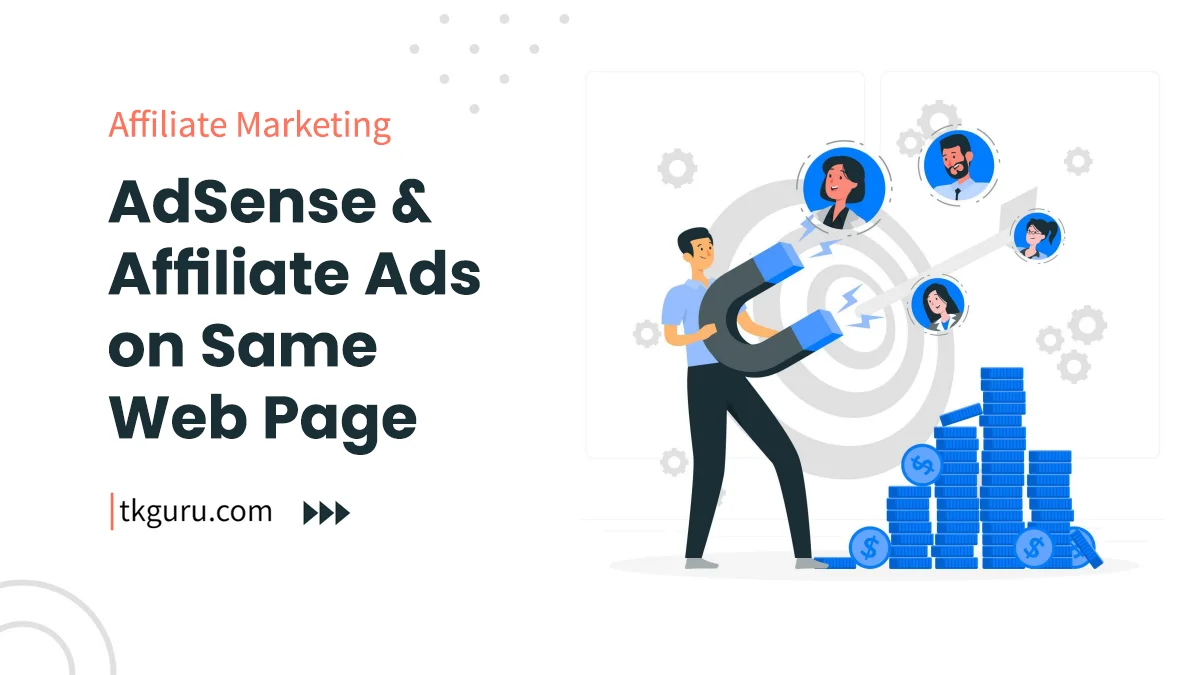
AdSense & Affiliate Ads on Same Web Page – Google AdSense and Affiliate marketing both are the best source of earning for bloggers at this time.
So, many new bloggers wants to implement both Google AdSense ads as well as Affiliate ads on their blog or website but they are confused about it. The most common question in their mind is
“Can I use AdSense and Affiliate ads on the same page of my website.
Will it be a violation of AdSense program policies ?
Will it be a violation of Affiliate program policies ?”
This is a most common question among new bloggers who just started blogging and they just get Google AdSense account approved for their new website.
They also have approved Amazon, Flipkart, eBay, Bluehost, Hostgator like companies affiliate program account for their website.
Contents
- 1. Can I Use AdSense Ads along with Affiliate Ads on Same Web Page?
- 2. Google AdSense vs Affiliate Ads: Which is the Better Choice for Your Website?
- 3. How to Effectively Monetize Your Blog with Google AdSense and Affiliate Ads
- 4. The Benefits of Combining Google AdSense and Affiliate Ads on Your Website
- 5. How to Choose the Right Affiliate Ads to Complement Your Google AdSense Strategy
- 6. 10 Tips for Increasing Your Click-through Rates with Google AdSense and Affiliate Ads
- 7. The Pros and Cons of Using Google AdSense and Affiliate Ads on Your Website
- 8. How to Optimize Your Website for Google AdSense and Affiliate Ads
- 9. 5 Common Mistakes to Avoid When Using Google AdSense and Affiliate Ads
- Suggestion
- Conclusion
- AdSense & Affiliate Ads FAQs
1. Can I Use AdSense Ads along with Affiliate Ads on Same Web Page?
The Answer is “Yes” you can place AdSense ads and Affiliate ads on the same web page and this does not violate neither AdSense program policies nor Affiliate program policies.
Here we are providing a screenshot from the official Adsense help page, which clearly says that : “We do allow affiliate or limited-text links.”
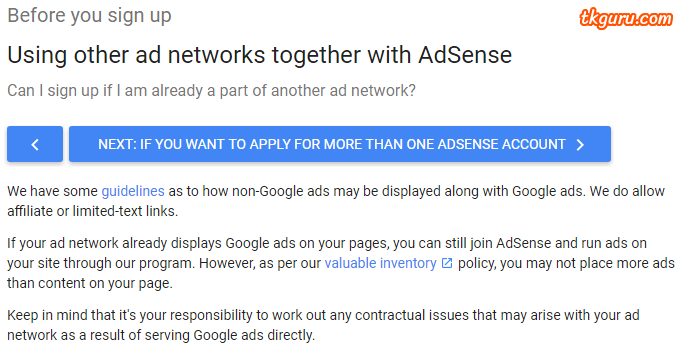
AdSense Ad implementation policies
Google have some guidelines for how non-Google ads may be displayed along with Google ads.
Here we are providing a list of Ad implementation policies which one must check before placing AdSense ads and Affiliate ads on the same web page.
Avoiding accidental clicks:
- Encouraging accidental clicks
- Unnatural attention to ads
- Placing ads under a misleading heading
- Site layout that pushes content below the fold
- Aligning images with ads
- Formatting content to mimic ads
- Offering compensation
- Distance between ads and flash games
Ensuring proper ad placement:
- Valuable inventory
- Auto-refreshing ads
- Ads on thank you, exit, log in, or error pages
- Ads on dynamic content
- Ads in emails
- Ads in a software application
- Ads in a new window
- Ads in pop-up and pop-under windows
- Ads on a site with pop-ups or pop-unders
- Ads on pages behind a login
- Ads on the same page or site as another publisher
- Ads on a hosted site (e.g., Blogger)
- Displaying a third party site on your page
More Details: Ad Implementation Policies
2. Google AdSense vs Affiliate Ads: Which is the Better Choice for Your Website?
Google AdSense and affiliate ads are two popular ways of earning money through online advertising.
While Google AdSense displays ads based on the content of your website and pays you when users click on those ads, affiliate ads pay you a commission when users purchase a product or service through a link on your website.
Here are some pros and cons of each option:
Google AdSense Pros:
- Easy to set up and requires minimal maintenance
- Large pool of advertisers to choose from
- Ads are targeted to your audience’s interests
- You earn money for clicks, even if users don’t make a purchase
Google AdSense Cons:
- Revenue per click is generally low
- Ads can be intrusive and affect user experience
- Advertisers can choose not to display ads on your website if they don’t find it profitable
Affiliate Ads Pros:
- Higher earning potential than AdSense
- Ads can be more targeted to your audience’s needs
- Can help you build relationships with brands and companies
- You can choose which products or services to promote
Affiliate Ads Cons:
- Requires more effort to set up and maintain
- Success depends on your ability to choose the right products and promote them effectively
- Commission rates can vary widely between programs
- Can be more difficult to integrate with your website design
Ultimately, the choice between Google AdSense and affiliate ads will depend on your website’s content, audience, and goals.
In many cases, a combination of both can be effective in maximizing your earnings.
3. How to Effectively Monetize Your Blog with Google AdSense and Affiliate Ads
To effectively monetize your blog with Google AdSense and affiliate ads, you can follow these steps:
- Choose the right ad sizes and placements: Use a mix of different ad sizes and placements to maximize your earnings without hurting your user experience.
- Select relevant ads: Use targeting options to show ads that are relevant to your audience and match your content.
- Optimize your ad performance: Track your ad performance and experiment with different ad formats, placements, and colors to find what works best.
- Choose reputable affiliate programs: Work with reputable affiliate programs that offer high-quality products or services relevant to your audience.
- Disclose affiliate relationships: Always disclose your affiliate relationships to your audience to maintain trust and transparency.
- Avoid click fraud: Never click on your own ads or encourage others to do so, as this can result in account suspension.
- Focus on quality content: Ultimately, the key to monetizing your blog with Google AdSense and affiliate ads is to focus on creating high-quality, valuable content that attracts and retains readers.
4. The Benefits of Combining Google AdSense and Affiliate Ads on Your Website
Combining Google AdSense and Affiliate Ads on your website can bring various benefits, such as:
- Diversified Revenue: By having multiple sources of income, you can reduce the dependency on a single revenue stream and create a more stable income.
- Increased Revenue: Combining AdSense and Affiliate Ads can maximize your revenue potential by displaying targeted ads that complement your affiliate products.
- More Engagement: Affiliate ads can help you to provide more value to your audience by offering targeted products, while AdSense can attract new visitors to your website by displaying relevant ads.
- Better User Experience: By displaying a combination of ads, you can create a less intrusive ad experience for your audience, ensuring that ads are not too aggressive or repetitive.
- Improved Analytics: Combining AdSense and Affiliate Ads can give you valuable insights into how visitors interact with different types of ads, helping you to optimize your revenue strategy and improve overall performance.
5. How to Choose the Right Affiliate Ads to Complement Your Google AdSense Strategy
When choosing the right affiliate ads to complement your Google AdSense strategy, consider the following:
- Relevance: Choose affiliate ads that are relevant to your website content and target audience.
- Quality: Promote high-quality products or services that you believe in and have tried.
- Commission: Consider the commission rate offered by the affiliate program and choose those with high commission rates.
- Tracking: Look for affiliate programs with reliable tracking and reporting tools to help you monitor your performance and earnings.
- Ad placement: Place affiliate ads in locations that are visible but not intrusive to your visitors.
- Compatibility: Make sure that the affiliate ads you choose do not conflict with your Google AdSense ads in terms of size, placement, and design.
- Reputation: Choose affiliate programs with a good reputation and positive reviews from other publishers.
By following these tips, you can effectively monetize your website with a combination of Google AdSense and affiliate ads.
6. 10 Tips for Increasing Your Click-through Rates with Google AdSense and Affiliate Ads
- Place ads in prominent positions on your website where they are more visible to visitors.
- Use high-quality, relevant images to make ads more attractive to users.
- Experiment with different ad sizes and formats to find what works best for your website and audience.
- Make sure your ads are relevant to your website’s content and audience to increase their click-through rates.
- Use ad targeting to show ads to visitors based on their interests and browsing behavior.
- Optimize your website’s speed and performance to reduce page load times, which can impact ad performance.
- Write engaging, informative, and relevant content that encourages visitors to stay on your site and click on ads.
- Test different ad placements, colors, and styles to see what works best for your website and audience.
- Use ad-blocking detection tools to prevent visitors who use ad-blockers from accessing your content.
- Regularly monitor your ad performance metrics, such as click-through rates, revenue, and conversion rates, to identify areas for improvement.
7. The Pros and Cons of Using Google AdSense and Affiliate Ads on Your Website
Using Google AdSense and affiliate ads on your website has both pros and cons:
Pros:
- Revenue Generation: You can earn money from your website through ad clicks and affiliate sales.
- Diversification: By using both AdSense and affiliate ads, you can diversify your revenue streams and increase your overall earnings.
- Easy Setup: Both AdSense and affiliate ads are relatively easy to set up on your website.
- High-Quality Ads: AdSense serves high-quality, relevant ads to your website visitors, which can help increase click-through rates and earnings.
- Customization: With affiliate ads, you have control over the types of ads you display and can tailor them to your specific audience.
Cons:
- User Experience: Too many ads on your website can negatively impact user experience, leading to higher bounce rates and decreased engagement.
- Revenue Sharing: With affiliate ads, you only earn a commission when a sale is made, whereas with AdSense, you earn a small portion of the revenue generated from clicks.
- Ad Blockers: Some users may use ad blockers, which can decrease your ad revenue.
- Ad Blindness: Users may become blind to ads on your website if they see them too often, leading to decreased click-through rates.
- Violations: Violating AdSense or affiliate program policies can lead to account termination and loss of revenue.
8. How to Optimize Your Website for Google AdSense and Affiliate Ads
To optimize your website for Google AdSense and affiliate ads, follow these steps:
- Place ads in prominent locations: Place your ads in prominent locations on your website where they are easily visible to your visitors.
- Use relevant ad formats: Use relevant ad formats that match the content on your website. Google AdSense provides a variety of ad formats, such as text, display, and link units.
- Choose high-paying keywords: Choose high-paying keywords that are relevant to your website’s content. This will help increase the value of the ads that are displayed on your site.
- Use responsive ads: Use responsive ads that are optimized for different devices, such as desktops, tablets, and mobile devices.
- Test ad placements and formats: Test different ad placements and formats to see what works best for your website. You can use A/B testing to compare different ad placements and formats.
- Avoid overloading your site with ads: Avoid overloading your site with ads, as this can make your site look spammy and decrease the user experience.
- Monitor your ad performance: Monitor your ad performance regularly to see how your ads are performing and make changes accordingly.
- Use affiliate links strategically: Use affiliate links strategically to promote products and services that are relevant to your website’s content and your audience’s interests.
- Disclose affiliate relationships: Disclose your affiliate relationships to your audience to maintain transparency and build trust.
- Provide valuable content: Finally, provide valuable content to your audience to attract and retain visitors, which will increase the likelihood of them clicking on your ads and affiliate links.
9. 5 Common Mistakes to Avoid When Using Google AdSense and Affiliate Ads
Here are 5 common mistakes to avoid when using Google AdSense and affiliate ads:
- Placing too many ads on a page: Overloading your website with too many ads can negatively impact user experience and lead to a higher bounce rate.
- Not optimizing ad placement: It’s important to strategically place ads where they are more likely to be seen by visitors, such as above the fold or near content relevant to the ad.
- Failing to monitor performance: It’s important to regularly monitor ad performance to ensure that you’re getting the best possible results. This can help you identify any issues and make adjustments as needed.
- Using irrelevant ads: Displaying ads that are not relevant to your content or audience can result in a low click-through rate and ultimately lower earnings.
- Violating ad policies: Both Google AdSense and affiliate programs have strict policies that you must follow. Violating these policies can result in account suspension or termination, so it’s important to read and understand the policies before using these programs.
Suggestion
You can earn from AdSense programs on per click basis while using Affiliate programs you can earn on per sell basis.
The Affiliate program work well on product based sites while Google Adsense work well with information based sites. If your website serve for both purposes well then you can use both on your website.
Conclusion
Yes, you can use both AdSense ads and affiliates ads on the same page of your blog or website unless you do not violate AdSense content guidelines and provide a clean experience to your readers.
By now, you must have clearly understand that there is no issue in using both AdSense ads along with affiliate ads on the same web page.
AdSense & Affiliate Ads FAQs
AdSense is a program created by Google that allows website owners to earn money by displaying ads on their site. Advertisers pay Google to display their ads, and then Google shares a portion of that revenue with website owners who display the ads.
Affiliate ads are advertisements that promote a specific product or service and offer a commission to the website owner if someone clicks on the ad and makes a purchase.
AdSense ads are generally contextually relevant ads that are selected by Google's algorithms and displayed on a website. The website owner earns revenue based on the number of clicks or impressions on the ads. Affiliate ads, on the other hand, are typically chosen by the website owner and are specifically designed to promote a particular product or service. The website owner earns a commission if someone clicks on the ad and makes a purchase.
Yes, it is possible to use AdSense and affiliate ads on the same website. However, it is important to make sure that the ads do not compete with each other and that they are not in violation of any of Google's policies.
To get started with AdSense, you will need to create an account with Google and follow the instructions to add the ad code to your website. For affiliate ads, you will need to find an affiliate program that is relevant to your website and apply to join. Once you are accepted into the program, you can begin adding affiliate ads to your website. What is AdSense?
What are affiliate ads?
How do AdSense and affiliate ads differ?
Can I use AdSense and affiliate ads on the same website?
How do I get started with AdSense and affiliate ads?
| Web Hosting | Website |
| WordPress | Google Adsense |
| SEO | Affiliate Marketing |
| Blogging | YouTube |
Related Posts
- Top Affiliate Programs Idea for Tech Bloggers: Monetize Your Expertise
- Top Affiliate Marketing Niches: Unveiling Lucrative Opportunities of Earning
- Amazon Affiliate WordPress Plugins 2023
- Effective Strategies for Promoting Amazon Affiliate Links
Related Tags
adsense and affiliate ads on same web page, google adsense, can i use adsterra with adsense, amazon affiliate, minimum post for adsense approval, can i use one adsense account for multiple sites, amazon adsense, do i need a website for adsense


